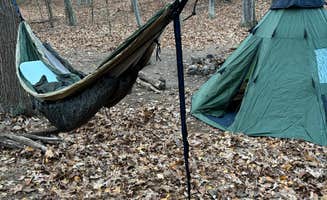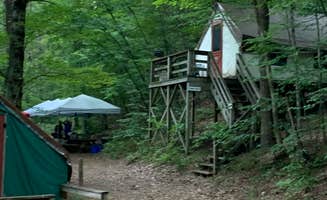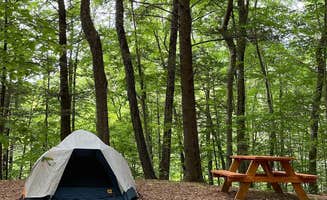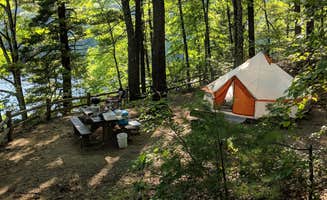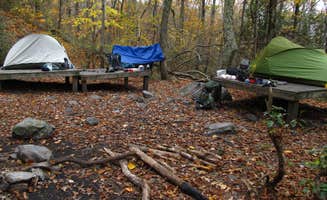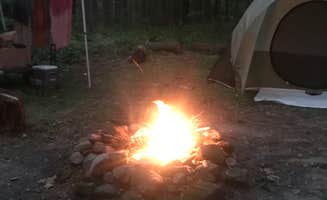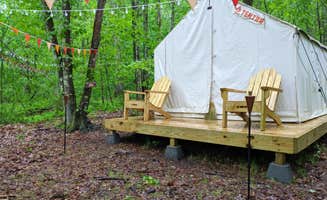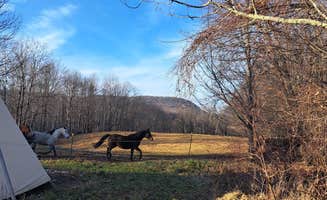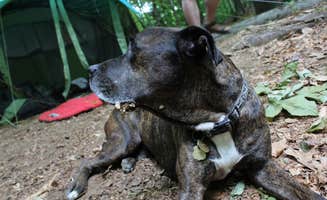Tent camping near Montgomery, Massachusetts provides access to both primitive backcountry sites and more developed campgrounds within a 40-mile radius. The region sits at the eastern edge of the Berkshire Mountains with elevations ranging from 400 to 2,000 feet, creating varied camping environments. Summer temperatures typically average 75-85°F during days and 55-65°F at night, with humidity levels higher than western Massachusetts.
What to do
Swimming and water recreation: Tully Lake Recreation Area offers multiple water activities beyond just camping. As camper Ben P. notes, "We take our canoe and spend the whole day at the lake. You can find lots of private areas to swim, pick blueberries and relax." The lake supports paddling, swimming, and shoreline exploration.
Hiking with waterfall views: Located near Chester Railway Station, Doane's Falls features a series of cascading waterfalls accessible via a short hiking path. Campers frequently combine an overnight stay with waterfall exploration during spring runoff season when water volume is highest.
Whitewater adventures: Zoar Outdoor in Charlemont provides camping with direct access to river activities. According to Dominick V., "Staff was awesome, went out of their way to take care of our group from camping to rafting. Amenities are well maintained." Rafting trips run from mid-April through October with different difficulty levels.
Mountain summit hiking: The Appalachian Trail sections near Mount Washington State Forest offer challenging day hikes from tent campsites. Tina D. describes the experience: "The views once you get up there are nothing short of stunning and there is a short section of trail that's really the kind of spot that makes you go 'This is why I hike!'"
What campers like
Cart-assisted walk-in sites: Tully Lake's system makes primitive camping more accessible. Sa R. explains, "You park & walk in but they provide carts. Canoe, kayak & paddleboard rental available. Showers & bathrooms by the parking area." The carts allow campers to transport gear from parking areas to sites up to a mile away.
Privacy between campsites: Many campers highlight the spacing between sites as a major advantage of tent camping in this region. Megan G. from Tully Lake Recreation Area notes, "We stayed at site 1, which was HUGE and extremely private. Sites closer to the water that we saw were less private, but still very peaceful and spread out."
Bear-proof storage amenities: Kay D. points out that at Alander Trail Campground, "They give you a semi-flat area for a tent, a fire pit and grill rack, one picnic table, and a bear box you would be sharing with other campers nearby." These bear boxes provide safer food storage for overnight backcountry camping.
Vehicle-free camping experience: The absence of cars creates a different atmosphere. Megan G. appreciates that at Tully Lake there are "No cars at all at the campsites, which was great for peace of mind as our toddler roamed around. It also made for a super quiet stay."
What you should know
Reservation timing requirements: Popular sites book extremely quickly. Nancy R. advises for Tully Lake: "There are some prime camp sites with direct access to the lake, but suggest you be prepared to call early in the morning of the first day State Campground reservations can be made, if you want one of these!"
Cell service limitations: Jean C. reports that near Barton Cove Campground, "Cell coverage is pretty close to absent or poor in most of the area, so download any maps you might want (driving, trail, geocaching) before you arrive." This applies to most campgrounds throughout the region.
Varied fire regulations: Fire restrictions differ significantly between campgrounds. Seth K. notes that at Zoar Outdoor "they don't allow fires at the campsites though which is annoying and their quiet hours are quite oppressive." Always check current fire restrictions before arrival.
Water availability: Most primitive campgrounds lack reliable water sources. For Tully Lake, Nancy R. explains, "The bathrooms are located near the entrance to the Park, and include flush toilets as well as coin operated, hot showers, open 24/7."
Tips for camping with families
Site selection for bathroom access: With children, bathroom proximity matters. Lauren A. shares from her Tully Lake experience: "Our site was fairly far from services, long run with small kids in the middle of the night. Not our favorite place, but to be fair mostly based on our site and neighboring campers."
Kid-friendly learning opportunities: Several campgrounds host educational programs. At Onion Mountain Park, Marshall S. notes, "My BSA troop has been going here for years to help new scouts learn to camp. It is a very casual site and good for your first trip, you are close to your car and the road in case you need it."
Plan for bugs in summer months: Insect activity peaks during warmer months. One camper at Tully Lake mentions they found it "Buggy in June so bring your repellent." Mosquitoes are most active at dusk near water bodies, while ticks remain a concern in wooded areas throughout summer.
Campground supervision varies: Holiday weekends bring different camping demographics. Lauren A. observes about Tully Lake: "We went memorial day weekend few years ago, busy holiday of young teens partying. Park staff tried their best, but other campers definitely took away from our stay."
Tips from RVers
Tent-only areas preserve quiet: Since most campgrounds in this region focus on tent camping, RV access is limited or non-existent. Campers at Sodom Mountain Campground mention ongoing improvements after ownership changes, with Brad N. noting: "All roads are dirt and all potholes have been repaired. The clubhouse is being renovated and activities are now back."
Check campground classifications: Many locations near Montgomery don't accommodate RVs. When tent camping at Brassie Brook Shelter, Nora S. describes it as "a small lean-to as well as about 4/5 campsites located all around. Firepits, toilets but that's about it." Campsites like this are strictly for tent campers with no RV access.


